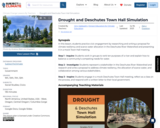
SYNOPSIS: In this lesson, students practice civic engagement by researching and writing a proposal for climate resiliency and scarce water allocation in the Deschutes River Watershed and presenting it in a mock Town Hall meeting.
SCIENTIST NOTES: The lesson allows students to propose ways to solve water scarcity in their local communities and engage with key stakeholders and policymakers to design policies that will enable local communities in Oregon to manage their water resources while building their resilience to climate change. The lesson and all the accompanying materials were reviewed and are suitable for teaching.
POSITIVES:
-Students engage in a mock Town Hall and learn how to build community while voicing community concerns.
-Students practice listening skills and engage in discourse over an important issue.
-Students learn to collaborate with different stakeholders and diverse voices, working together to find a solution that best fits a community.
-Students practice using local research to support their ideas.
-Students learn to write and present a proposal.
-The lesson can be spread out over two to four days, with a full day for research, a full day for the Town Hall, a day for voting or decision-making, and a day for letter writing and sharing in the class.
ADDITIONAL PREREQUISITES:
-Students should have an understanding of media literacy and best research practices.
-Students should have a basic understanding of rhetorical structure and devices for persuasion in oral delivery techniques.
-Teachers should review the general overview and agenda in the Town Hall Guide and make adjustments as needed.
-You will need to make a copy of the Student Slideshow for each group of students and grant them editing rights before the lesson. Students will be writing in the Student Slideshow.
DIFFERENTIATION:
-Students with little experience in persuasive speaking could use some instruction on rhetorical methods and devices using these resources:
-41 Rhetorical Devices That Will Make Your Words Memorable
-How to Use Rhetoric to Get What You Want
-PBS Literary Elements & Techniques: Imagery and Figurative Language.
-Students could develop their research into a Community Action Project proposing policy to actual stakeholders.
-Students could connect with local stream restoration projects or organizations as a hands-on learning experience.
-Students could lead a school community education campaign to spread awareness of water-saving techniques.
- Subject:
- Political Science
- Social Science
- Material Type:
- Lesson Plan
- Provider:
- SubjectToClimate
- Author:
- Amy Sabbadini
- Classroom Law Project
- Date Added:
- 07/06/2023